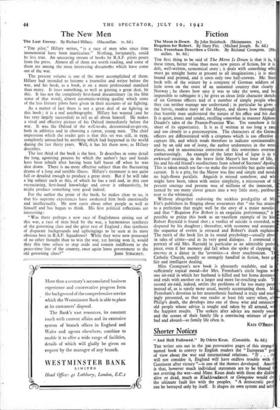The New Men
The Last Enemy. By Richard Hillary. (Macmillan. 75. 6d.)
" THE pilot," Hillary writes, " is a race of men who since time immemorial have been inarticulate." Nothing, fortunately, could be less true. An unceasing stream of books by R.A.F. pilots pours from the press. Almost all of them are worth reading, and some of them are among the most interesting documefits which have come out of the war.
The present volume is one of the most accomplished of them. Hillary had intended to become a journalist and writer before the war, and his book, as a book, is on a more professional standard than many. It loses something, as well as gaining a great deal, by this. It has not the completely first-hand documentary (in the film sense of that word), almost automatic-writing quality which some of the less literary pilots have given in their accounts of air fighting.
As a matter of fact there is not a great deal of air fighting in this book ' • it is a real autobiography. Hillary has wanted (and he has very largely succeeded) to tell us all about himself. He makes a vivid and effective picture of his Oxford immediately before the war. It was the Oxford of the well-to-do, determined-to-get-on, both in athletics and in choosing a career, young men. The chief impression which the reader gets is that this set was still, in 1939, completely untouched by anything which had happened in the world during the last thirty years. Well, it has hit them now, as Hillary describes.
The last third of the book is the best. It describes in some detail the long, agonising process by which the author's face and hands have been rebuilt after having been half burnt off when he was shot down. There is no more effective subject than the fluctuating drama of a long and terrible illness. Hillary's treatment is not quite full or detailed enough to produce a great story. But if he will take a big subject such as this, of which he has a real and, in this case excruciating, first-hand knowledge and cover it exhaustively, he might produce something very good indeed.
For the author the point of the book, he makes clear to us, is that his supreme experiences have awakened him both emotionally and intellectually. He now cares about other people as well as himself and has begun to think. His first political reflections are interesting : " Was there perhaps a new race of Englishmen arising out of this war, a race of men bred by the war, a harmonious synthesis of the governing class and the great rest of England ; that synthesis of disparate backgrounds and upbringings to be seen at its most obvious best in R.A.F. Squadrons? While they were now possessed of no other thought than to win the war, yet having won it, would they this time refuse to step aside and remain indifferent to the peace-time fate of the country, once again leave government to the


























 Previous page
Previous page